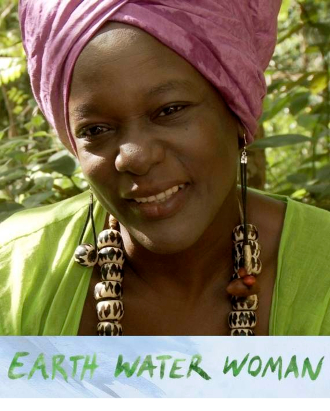
Earth Water Woman: Community & Sustainability in Trinidad & Tobago 2013
Distributed by Good Docs
Produced by Sarah Feinbloom, Diana Fox, and Alexandra Swati Guild
Directed by Sarah Feinbloom and Alexandra Swati Guild
DVD, color and b&w, 23 min.
Jr. High - General Adult
Agriculture, Documentaries, Ecology, Environmentalism, Films, Sustainable Living, Water
Date Entered: 10/29/2014
Reviewed by Kathleen Spring, Nicholson Library, Linfield College, McMinnville, ORBy the early 1980s in Fondes Amandes, a small community in St. Ann’s (a suburb of Port of Spain, Trinidad), “a cancer of deforestation facilitated by physical development” had caused entire hillsides to disappear. Other nearby communities would come to Fondes Amandes to dump and burn their trash, a practice that decimated the local environment and led to extensive deforestation. In 1982, Akilah Jaramogi and her husband Tacuma founded the Fondes Amandes Community Reforestation Project (FACRP) to try to combat this problem and protect the local watershed. Earth Water Woman examines what FACRP has been able to accomplish since its inception and offers a glimpse at a local solution for approaching climate change.
As Rastafarians, the Jaramogis viewed a return to the land both as an act of protest and as a way to practice their spiritual, political, and environmental beliefs. Akilah actively sought to improve conditions for Rasta women in Trinidad. Like Penelope Beckles, the former Minister of the Environment for the Government of Trinidad & Tobago, Akilah believed if women became involved in agriculture they could transform society. Although they faced challenges with human behavior, the Jaramogis worked to convince others to join them in their efforts to protect the ecosystem. As a result, over a period of nearly 30 years FACRP has planted approximately 60,000 seedlings on 125 acres with an eye towards maintaining and increasing biodiversity; this has improved the soil quality, restored wildlife to the area, maintained local water sources, and allowed community members to harvest food such as cassava, yams, and fruits.
Filmmakers Sarah Feinbloom and Alexandra Swati Guild draw on archival photographs and interviews with Akilah and other members of the Fondes Amandes community, as well as interviews with various government officials, to demonstrate how small environmental movements can make a difference in the fight against climate change. The project is placed in a broader historical context through the use of slides that give brief exposition for the viewer. Overall, the narrative structure is clear and is accompanied by an excellent sound design that highlights the sounds of the forest and watershed; subtitles are available in both English and Spanish. Earth Water Woman will support courses in environmental studies, forestry, gender studies, and entrepreneurship; public libraries would also benefit from this film.